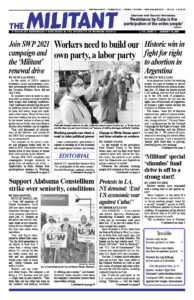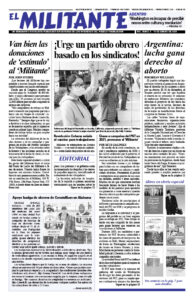January 22, 1996
STOCKHOLM — “We want to fight to increase production, whether at workplaces, the university, or in the army, and win youth to the revolution,” said Jonathan Quirós Santos, a leader of the Union of Young Communists of Cuba, during a five-week tour of Sweden, Iceland, Norway and Denmark.
Quirós spoke of the efforts by the Cuban people to overcome the effects of the deep economic crisis in his country. “We have had to do many things we did not like to do that have increased inequalities in Cuba.”
Quirós described the debate on proposals to tax the workers’ income as one way to deal with the financial crisis.
“The discussion was taken into every workplace,” he said, referring to the “workers parliaments” held in 80,000 factories and offices. “There was a broad consensus among the workers that they [working people] should not be taxed.”
January 22, 1971
LOS ANGELES — On Jan. 9, around 1,500 young Chicanos demonstrated their anger at continued police brutality in East Los Angeles.
The Chicano Moratorium Committee called the demonstration to protest the arrest on false charges of 52 members within a month. A leaflet calling for the demonstration said, ‘’We have been attacked, harassed and beaten day after day by the Los Angeles Police Department, the Metro Squad, and the Hollenbeck division of the LAPD. We have dared to speak out against the police brutality. If they attack one of us, they attack all of us.”
There were thousands of cases of police brutality since Aug. 29, when police attacks brought the deaths of three Chicanos. Threats by police “to arrest anyone seen coming out of Chicano Moratorium offices” forced the closing of the bungalow office in December.
January 19, 1946
The worldwide GI demonstrations coincide with the greatest labor upsurge in American history. These simultaneous struggles have colossal significance.
One common cause binds the workers and soldiers together. They belong to a common class, the working class. They are engaged in a common fight against a common foe. The men in uniform clamoring to come home are the sons, brothers, husbands of the men and women on the picket lines.
Who denies these just demands of the workers and the soldier ranks? A vicious gang of monopolists, who control the American economy, who dominate the big banks and corporations, who dictate the policies of the government and its armed forces.
United, the workers and the soldiers have the power to defeat Wall Street’s plot to degrade American labor and subjugate the world.

